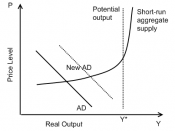Adam Smith (1776) has come to be regarded as the 'father' of economics because he put forward a unique proposition: that the wealth of the nation or state would be best advanced by allowing each individual in the nation to pursue freely what he himself thought were his own best economic interests. (Adam S; 1776)
In the beginning mankind grow vegetables, rear animals like chicken, cow, goat and others for their own use. The initial subsistence economic changes to barter economic when one has access of something that might be useful for others like nuts, wood, wool and others. During this time, people traded one good for another for example a fisherman want to buy vegetables from a farmer. The fisherman can only have trade if there is coincidence of wants. According to Waud (1983), the difficulties involved in finding a coincidence of wants tend to discourage specialisation and trade in barter economy.
This gave way to the money economy, where goods are exchanged for price.
The twentieth century experiences the industrial revolution, where new methods of mass production radically altered the way the economy functioned. The telegraph gave way to the telephone, the horse carriage to the car, changing the communications and transportations forever. The other half of this century has encountered another revolution, which called technological revolution that uses computers to simplify many procedures. The end of this century has seen the birth of the 'Digital Economy' or also being called as 'Weightless Economy', 'Knowledge Economy', 'Internet Economy', 'New Economy' and others, where the use of the Internet serves to globalise the traditional market functions, creating electronic commerce and electronic business.
The term "New Economy" describes aspects or sectors of an economy that are producing or intensely using innovative or new technologies. (Ref. 9) These relatively...



Comment
Waud is a secondary source - better to cite whoever first wrote about the need to have a coincidence of wants.
0 out of 0 people found this comment useful.